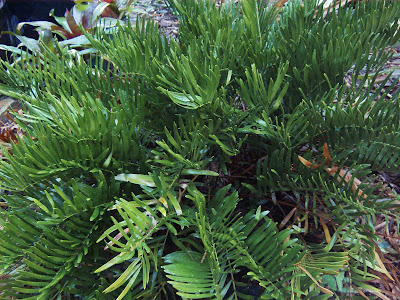Zamia pumila is a great evergreen plant native to Florida and the Bahamas. It has a nice, soft, fern-like look, although the leaves are actually quite tough. Zamias are members of the Cycad family which have been flourishing on earth since the time of the dinosaurs!
This species stays under 3 feet in height and makes a low mound a little wider than it is tall.
Zamias are drought-tolerant and will grow in sun or shade. They are hardy to USDA Zone 8. The leaves also serve as food for the larvae of the rare Atala butterfly.
Florida's original inhabitants (before the European invasion) used to process the thick trunks into an edible starch that they used like bread flour.
Flower cones appear in the fall, with male and female flowers appearing on separate plants. They are wind-pollinated. The female flowers are chunky and club-like:Zamias are drought-tolerant and will grow in sun or shade. They are hardy to USDA Zone 8. The leaves also serve as food for the larvae of the rare Atala butterfly.
Florida's original inhabitants (before the European invasion) used to process the thick trunks into an edible starch that they used like bread flour.
The male flowers are slender:
Here you can see a mature cone splitting open to reveal the seeds. To the upper left of this photo is a brown immature cone ready to be fertilized by pollen floating on the breezes. Plants in close proximity are also pollinated by snout beetles.
In their natural setting, seeds take up to two years to germinate. To speed up the process, you can scrape off the fleshy orange coating, soak the seeds for a day in water, then sow 1/2 inch deep in well-draining soil in full sun. Keep the soil moist with daily watering and you should see new seedlings in as little as 3-4 weeks!






2 comments:
Hi Jim...I had noticed that these plants survived the freezing weather. Thanks for the great info. on them. I will definitely be adding some to my garden this spring.
I love coonties! I have a single specimen that my mom passed along a couple years ago. She has grown them in her garden for years. Great tough plant for Florida (and a native)!
Post a Comment